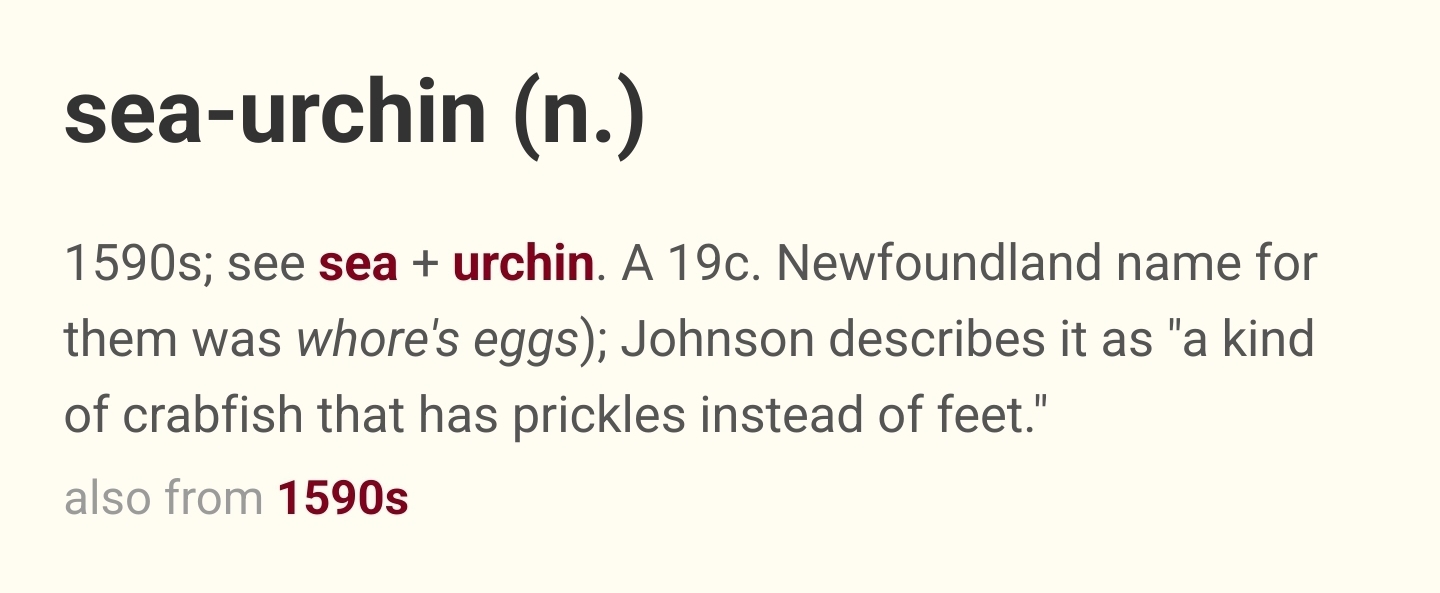I went to fact check this. It's real but I feel like we're missing out on something here

A place for majestic STEMLORD peacocking, as well as memes about the realities of working in a lab.

Rules
This is a science community. We use the Dawkins definition of meme.
I went to fact check this. It's real but I feel like we're missing out on something here

lol whore's eggs
Explains why Frank would have eaten them.
Amazing.
In dutch they are literally called sea-hedgehog. (zee-egel)
So, while latin and all is nice, there's always the dutch way of "doe maar normaal dan doe je gek genoeg". Which translates into: just behave as regular, that's more than enough excitement.
same in German, Seeigel
Same in Spanish, but from a different root-word. Erizo del mar, which erizo is just a normal hedgehog
Same in Slovene. Morski jež - sea hedgehog
This is turning into the whole ananas / pineapple thing where English is the outlier again.
Same in danish: Søpindsvin
Sea-stick-swine
Continuing the chain, same in Brazilian Portuguese: "Ouriço-do-mar"
Dutch isn’t real
Je bent niet echt
It's actually the same in italian, ricci di mare
"doe normaal.."
In french they're "oursins", apparently from bears, which they thought had very hard fur.
Similarly, seals? Sea dogs.
Street urchins aka boulevard hedgehogs
See, this is why etymology is such a fascinating field, and why learning Latin and Greek are still worthwhile.
Do you speak Latin? I'm trying to learn Latin for fun, and I would like some recommendations. I already have the first Lingua Latina Per Se Illustrata PDF.
I do (or did) speak Latin. Nowadays it’s mostly bits and pieces.
I’m sorry, but I don’t have anything to recommend
I'm confused! Doesn't urchin really relate to children?
Is that a colloquialism or more English-on-drugs?
The use of "urchin" to refer to children is separate from its original meaning.
Maybe it became that as a word for something underfoot?
I like this one the best!
Thats a street urchin. Strangely, this blog post was one of the first links that came up. It ponders how the name street urchin came to be.
It says
Looking in the OED, I see two possibly relevant definitions. 1c. A goblin or elf. (From the supposition that they occasionally assumed the form of a hedgehog.)... There is also 4a. A pert, mischievous, or roguish youngster; a brat.
Edit: formatting is crazy
In French, oursin (urchin) seems to be the diminutive of ours, which means bear. So oursin means something like "little bear".
I read somewhere that male hedgehogs have really long dicks. Long enough that they can jack themselves off with their arms. They make awful pets because they get cum everywhere and it starts smelling real bad real fast.
No idea if this is true or not.
Username checks out
Completely unrelated, in Norway we call them "crow balls" (kråkeboller)